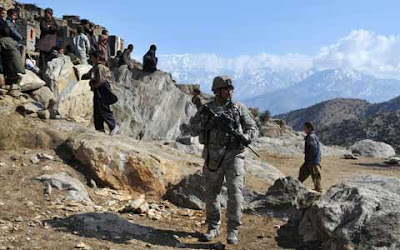THE nine-year military operation in Afghanistan has claimed its most important scalp to date after the Taleban's deputy leader was arrested.

Mullah Abdul Ghani Baradar, responsible for the organisation's military strategy in Afghanistan, was captured by United States and Pakistani forces in a secret joint operation in Karachi.
It comes at a crucial time, as Nato forces engaged in Operation Moshtarak advance into Taleban strongholds in the southern Afghan province of Helmand.
Baradar was second in influence only to Taleban founder Mullah Mohammad Omar, and his arrest has raised hopes that the insurgency will be weakened.
It is understood he was held at a roadside checkpoint between seven and ten days ago and has since been held at a secret location where he is undergoing interrogation from intelligence officials from the US and Pakistan. One Pakistani officer said Baradar "was talking".
His capture – which has been denied by the Taleban – follows the escalation of CIA missile strikes against militant targets along the border between Afghanistan and Pakistan that have reportedly killed many mid-level insurgent commanders.
The involvement of Pakistan's Inter-Services Intelligence agency, which is thought to have led the raid, suggests Islamabad is becoming increasingly receptive to US demands to take a hard-line approach to terrorists using the country as a safe haven.
Pakistani interior minister Rehman Malik would not confirm the arrest and said only that the authorities had arrested a "number of people who are running away from Afghanistan and coming to Pakistan".
John Kerry, chairman of the US Senate foreign relations committee, claimed the development was evidence of greater co-operation between the two states.
He said: "I think that is really a signal that wherever people go, wherever they are, the government of Pakistan is determined to continue to ferret out those people who engage in violent extremist acts against the people of Pakistan."
Sher Mohammad Akhud Zada, a former governor of Afghanistan's Helmand province and a member of the Afghan parliament, said: "If Pakistani officials had wanted to arrest him, they could have done it at any time. Why did they arrest him now?"
Baradar is regarded as the brains behind the Taleban's military strategy of hit-and-run attacks, improvised explosive devices and ambush tactics.
He is said to have told his sub-commanders last July: "Keep your weapons on your backs and be on your motorcycles. America has greater military strength, but we have greater faith and commitment."
Baradar, 42, who has never been photographed, fought against Soviet forces in the Afghan mujahideen war, ran the organisation's leadership council, known as the Quetta Shura, and is in charge of the Taleban's financial planning. According to Interpol, he was deputy defence minister in the Taleban regime that ruled Afghanistan until it was ousted in the 2001 US-led invasion. More recently, he has spearheaded the fighting in south and south-west Afghanistan, where British forces are concentrated.
Like other Taleban leaders, he is subject to UN sanctions, which include the freezing of his assets, a travel ban and an arms embargo.
With Baradar no longer responsible for co-ordinating military operations, opinion was divided among analysts as to the impact his arrest will have on the Taleban's efforts to repel Nato forces.
Major General Nick Carter, the British commander of Nato forces in southern Afghanistan, said while he was not aware of Baradar being involved specifically in Marjah and Nad-e-Ali, his arrest was indicative of a "dislocated" leadership among the Taleban.
He said: "It's obviously encouraging from our perspective if some of their strategic-level players are being rolled up. In terms of the leadership on the ground, our sense is that they have been significantly dislocated.
"Certainly, the nature of the resistance that both the US Marine Corps and the ANSF (Afghan National Security Forces] have met in Marjah would indicate that that is the case. And that's also been the case in northern Nad-e-Ali."
Publicly, at least, Baradar has rejected any notion of a deal with the United States.
In an interview last year, he said the Taleban did not see the point in reconciliation talks with the Afghan government or Washington. "Our basic problem with the Americans is that they have attacked our country," he said.




Oh dear - it is **so easy** to disprove Baradar's comment, and **prove that he is lying**.
ReplyDeleteWhat an odd "attack" this is. An "attack" with the blessing of the "attacked" country's government!
An "attack" that steadily builds up the military forces of the "attacked" country!
An "attack" where the "attacker" builds dozens of medical clinics, and builds and refurbishes many hundreds of schools!
An "attack" that builds hundreds of kilometers of roads in the "attacked" country!
Hey, Baradar - if you are so "protective" of Afghanistan, then **why does the Taliban burn down the country's own schools?**
Oh, that's right - it's so that the population does not become educated and find out that Islam is a pack of lies. As soon as they do, then ***poof*** goes the Taliban house of cards.
Nope - the only thing being "attacked" is your Taliban, Baradar. Get used to it. We are long since used to your lies.